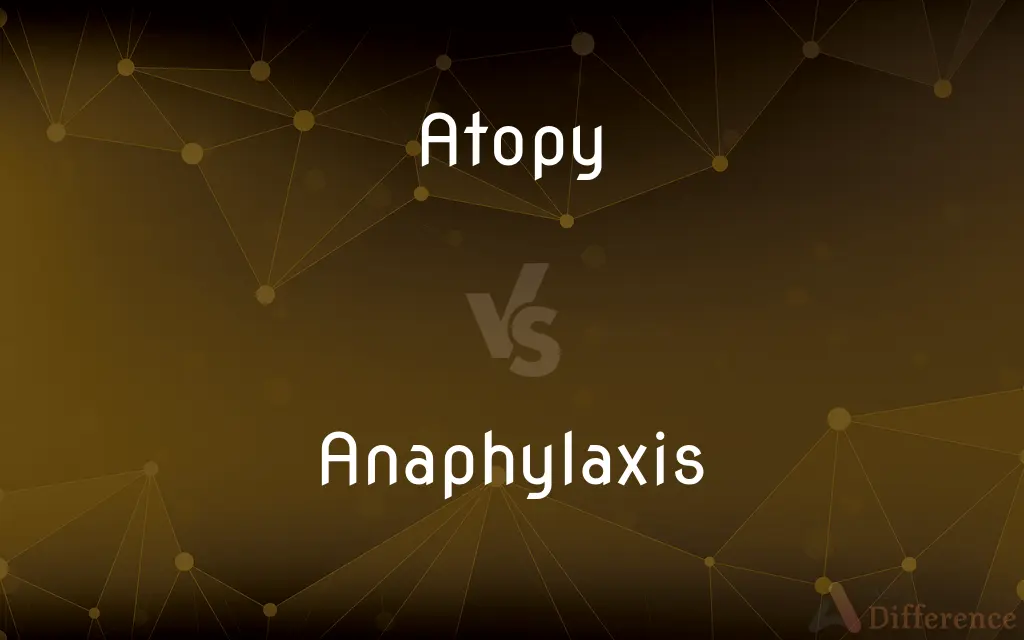Atopy vs. Anaphylaxis — What's the Difference?
By Tayyaba Rehman & Maham Liaqat — Updated on April 22, 2024
Atopy refers to the genetic tendency to develop allergic diseases such as asthma, whereas anaphylaxis is a severe, potentially life-threatening allergic reaction to allergens like food or bee stings.

Difference Between Atopy and Anaphylaxis
Table of Contents
ADVERTISEMENT
Key Differences
Atopy is a predisposition toward developing certain allergic hypersensitivity reactions. It is associated with conditions like asthma, allergic rhinitis, and eczema. Whereas anaphylaxis is an acute and severe allergic reaction that can rapidly become life-threatening.
Atopy typically manifests in chronic conditions that are often present throughout an individual's life, such as asthma or eczema. On the other hand, anaphylaxis is characterized by sudden, severe symptoms that require immediate medical intervention.
Individuals with atopy may be more likely to experience allergic reactions, but not all of these reactions are life-threatening. In contrast, anaphylaxis involves severe symptoms like difficulty breathing, a sharp drop in blood pressure, and potential loss of consciousness.
Atopy involves a wide range of allergic symptoms that can be managed with ongoing treatment and avoidance of triggers. Anaphylaxis, however, demands immediate emergency treatment, typically with epinephrine, to prevent severe outcomes including death.
While both conditions are immune responses to allergens, atopy does not always result in immediate or severe reactions like anaphylaxis does. Anaphylaxis is always considered an emergency with rapid onset of symptoms.
ADVERTISEMENT
Comparison Chart
Definition
Genetic tendency to develop allergic diseases
Severe, rapid allergic reaction
Associated Conditions
Asthma, eczema, allergic rhinitis
Life-threatening reactions, including shock
Symptoms
Chronic, manageable allergic reactions
Acute, severe, life-threatening reactions
Treatment
Long-term management, avoidance of triggers
Immediate emergency intervention (epinephrine)
Risk
Non-life-threatening typically
Potentially life-threatening
Compare with Definitions
Atopy
Associated with hypersensitivity to common allergens.
People with atopy may react strongly to pet dander.
Anaphylaxis
Can be triggered by foods, insect stings, or medications.
Bee stings can cause anaphylaxis in sensitive individuals.
Atopy
Can lead to chronic conditions like eczema.
Her atopy manifests as severe eczema during the winter months.
Anaphylaxis
Considered a medical emergency.
Emergency services must be called immediately when anaphylaxis occurs.
Atopy
Often managed through environmental control and medication.
He manages his atopy with air purifiers and regular medication.
Anaphylaxis
A severe allergic reaction that is rapid in onset.
Within minutes of eating peanuts, she experienced anaphylaxis.
Atopy
A genetic disposition to develop allergic reactions.
Atopy often runs in families, leading to conditions like asthma.
Anaphylaxis
Symptoms include swelling, hives, and difficulty breathing.
Anaphylaxis caused his throat to swell, obstructing breathing.
Atopy
Involves an immune system that tends to overreact.
Atopy causes his immune system to treat harmless pollen as a threat.
Anaphylaxis
Requires immediate treatment with epinephrine.
She carries an epinephrine injector to treat unexpected anaphylaxis.
Atopy
Atopy is the tendency to produce an exaggerated immunoglobulin E (IgE) immune response to otherwise harmless substances in the environment. Allergic diseases are clinical manifestations of such inappropriate, atopic responses.Atopy may have a hereditary component, although contact with the allergen or irritant must occur before the hypersensitivity reaction can develop (characteristically after re-exposure).
Anaphylaxis
Extreme sensitivity to a substance such as a foreign protein or drug.
Atopy
Of, relating to, or caused by a hereditary predisposition to developing allergic reactions, such as hay fever, asthma, or urticaria, after exposure to specific antigens such as pollen, food, and insect venoms.
Anaphylaxis
A severe and rapid systemic allergic reaction to an allergen, causing a constriction of the trachea, preventing breathing; anaphylactic shock.
Atopy
(medicine) A hereditary disorder marked by the tendency to develop localized immediate hypersensitivity reactions to allergens such as pollen, food etc and is manifested by hay fever, asthma, or similar allergic conditions; generally considered to be caused by the interaction of environmental and genetic factors.
Anaphylaxis
Hypersensitivity (to a protein or drug) resulting from prior contact with a substance.
Atopy
A person suffering from atopic syndrome; a case of atopy.
Anaphylaxis
An immediate but transient allergic reaction to an antigenic substance to which a person has become hypersensitized; it is characterized by the contraction of smooth muscle and capillary dilation. These reactions are caused by the release of certain substances such as histamine, bradykinin, serotonin, and slow-reacting substance in response to the reaction of the antigen with a mast cell-fixed antibody, chiefly IgE. This term is sometimes used to refer to the severe form of the reaction called anaphylactic shock.
Atopy
An allergic reaction that becomes apparent in a sensitized person only minutes after contact
Anaphylaxis
Hypersensitivity reaction to the ingestion or injection of a substance (a protein or drug) resulting from prior contact with a substance
Common Curiosities
Can atopy lead to anaphylaxis?
While atopy itself does not cause anaphylaxis, individuals with atopic diseases may be at increased risk of severe allergic reactions.
What triggers anaphylaxis?
Common triggers include certain foods, insect stings, medications, and latex.
What is anaphylaxis?
Anaphylaxis is a severe, rapid-onset allergic reaction that can be life-threatening.
What is atopy?
Atopy is a genetic predisposition to develop chronic allergic conditions like asthma, allergic rhinitis, and eczema.
Can both atopy and anaphylaxis be prevented?
While atopy is genetic and cannot be prevented, careful management and avoidance of known allergens can prevent anaphylactic episodes.
What are common symptoms of atopy?
Symptoms include sneezing, itchy eyes, eczema, and asthma.
How are atopy and anaphylaxis diagnosed?
Atopy is often diagnosed based on family history and allergy tests; anaphylaxis is diagnosed based on clinical symptoms during an acute episode.
Can lifestyle changes help manage atopy?
Yes, avoiding allergens, dietary management, and maintaining a clean environment can help control atopic conditions.
How is anaphylaxis treated?
Anaphylaxis requires immediate treatment with epinephrine, followed by professional medical help.
Is anaphylaxis always fatal?
If treated promptly with epinephrine and emergency care, anaphylaxis can be managed and is not always fatal.
How do atopy and anaphylaxis differ?
Atopy leads to chronic, often manageable allergic conditions, whereas anaphylaxis is a sudden, severe, and potentially deadly reaction.
Do atopy and anaphylaxis affect children differently than adults?
Both conditions can affect children and adults, but children may require special considerations for management and treatment.
What role do genetics play in atopy and anaphylaxis?
Genetics strongly influence atopy, whereas anaphylaxis can occur in anyone but is more likely in those with a personal or family history of allergies.
What should be done if someone is experiencing anaphylaxis?
Administer epinephrine immediately and call emergency services.
What emergency supplies should people with anaphylaxis carry?
Individuals at risk should carry an epinephrine auto-injector and ensure it is readily available at all times.
Share Your Discovery

Previous Comparison
Departure vs. Arrival
Next Comparison
Sharpshooter vs. MarksmanAuthor Spotlight
Written by
Tayyaba RehmanTayyaba Rehman is a distinguished writer, currently serving as a primary contributor to askdifference.com. As a researcher in semantics and etymology, Tayyaba's passion for the complexity of languages and their distinctions has found a perfect home on the platform. Tayyaba delves into the intricacies of language, distinguishing between commonly confused words and phrases, thereby providing clarity for readers worldwide.
Co-written by
Maham Liaqat















































